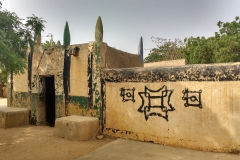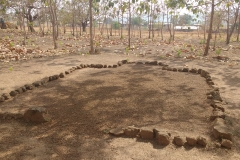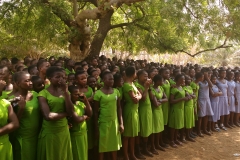A letter from Josh Heikkila, serving as Regional Liaison for West Africa, based in Ghana
April 2017
Write to Josh Heikkila
Individuals: Give online to E200353 for Josh Heikkila’s sending and support
Congregations: Give to D507520 for Josh Heikkila’s sending and support
Churches are asked to send donations through your congregation’s normal receiving site (this is usually your presbytery).
Some years ago in Niger, I met a Muslim man who relayed to me an experience he had with a visiting Christian missionary. While leading an evangelism program in the country, this missionary told him privately that the Quran is wrong. Curious to understand why the missionary felt this way, the Nigerien Muslim inquired, “Which part of the Quran is wrong?” The missionary replied, “All of it.” The Nigerien continued to ask, “But which aspect of it in particular do you have a problem with?” As the conversation went on, the Nigerien said it became clear that the Christian missionary had never read the Quran at all.
This Nigerien Muslim asked me to explain to him why a Christian missionary would say that the Quran is wrong if he knew nothing about it. It struck him as very ignorant and arrogant. Shouldn’t you at least be somewhat knowledgeable before making such a serious claim? And even then, shouldn’t your own faith – no matter what that faith might be – encourage you to be humble and respectful when speaking with someone of another?
The conversation has stuck with me through the past several years, and it’s shaped the way I go about my own work in West Africa. It’s also encouraged me to try to be much more knowledgeable about Islam.
Recently, I was reading through a section of the Quran, as I do from time to time, and I found myself admiring a particular passage:
The creation of the heavens and the earth, the alternation of night and day, the sailing of ships across the ocean with what is useful to mankind, the rain that God sends from the sky to enliven the earth that was once dead, the scattering of beasts of all kinds upon it, the changing of the winds, and the clouds which remain obedient between earth and sky, are surely signs for the wise. (2:164)
In fact, when I read these words from the Quran, they bring to mind words from Psalm 19:
The heavens are telling the glory of God and the firmament proclaims his handiwork. Day to day pours forth speech, and night to night declares knowledge. There is no speech, nor are there words; their voice is not heard. Yet their voice goes out through all the earth, and their words to the end of the world.
I like so much this Biblical notion that even the natural world around us makes known to us the glory of God. And I was happy to learn that this idea is in the Quran, too.
Really, it seems that much of the language about God in the Bible and the Quran would be appropriate in either Muslim or Christian settings. Look at the opening words of the Quran, for example:
Praise be to God, Lord of the Worlds, the Most Gracious, the Most Merciful, Master of the Day of Judgment. It is You we worship, and upon You we call for help. Guide us to the straight path, the path of those You have blessed.
This passage makes me think of Psalm 107:
Give thanks to the Lord, who is good, whose steadfast love endures forever. Or Psalm 1: Happy are those who do not follow the advice of the wicked, or take the path that sinners tread, or sit in the seat of scoffers; but their delight is in the law of the Lord, and on his law they meditate day and night.
Over the past few years, I’ve come to respect the passion my West African colleagues have for spreading the gospel through evangelism programs. We American Presbyterians can definitely learn from them! But at times, I also find myself feeling a bit uneasy.
When people learn that I am a “missionary”, they often ask me, how many souls have I won, how many heathens have I converted, how many people have I rescued from perishing? The more critical side of me wants to respond and say zero. I haven’t saved anyone, converted anyone, or rescued anyone. And the reason I haven’t is I don’t have this power. Only God can do these things.
But at the same time, I do believe in the need to speak with others about the Good News of Jesus Christ, because I believe it has the power to transform both individual lives and entire communities.
What we can do is share with other people stories about how following Jesus has changed us and allowed us to experience in our own lives the fruit of the Holy Spirit – love, joy, peace, patience, kindness, generosity, faithfulness, gentleness, and self-control. We can do this faithfully and with integrity. And everything else – any conversion of hearts, minds, and souls – is left to God.
I invite you to pray for our partners in West Africa – in Ghana, Togo, Nigeria, and Niger—as they embark on evangelism. Thank you for all the support you give, which allows us to help one another, and learn from each other, as we live out our Christian lives together.
-Josh
![]() You may freely reuse and distribute this article in its entirety for non-commercial purposes in any medium. Please include author attribution, photography credits, and a link to the original article. This work is licensed under a Creative Commons Attribution-NonCommercial-NoDeratives 4.0 International License.
You may freely reuse and distribute this article in its entirety for non-commercial purposes in any medium. Please include author attribution, photography credits, and a link to the original article. This work is licensed under a Creative Commons Attribution-NonCommercial-NoDeratives 4.0 International License.


